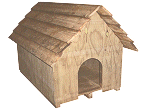
2: Identifying the parts and the materials list
3: The plans and building instructions
4: Building instructions continued
INTRODUCTION
This
kennel will accommodate a large dog with these dimensions
but can be reduced to be suitable for a dog of any size. The
kennel is constructed out of 150x19 rough-sawn treated pine
for the floor and roof (or alternatively 9mm exterior
plywood covered with roofing felt, 50x50 gauged or dressed
untreated pine for the framing, 50x50 gauged or dressed PT
(pressure treated) pine for the under floor skids (dressed
or finished size is usually 46x46) and one sheet of 9mm
exterior plywood from which the walls are cut
Note 1.
About pressure treated timber
Do not use pressure treated timber on any parts the dog may
chew. Pressure treated timber (PT, Tanalized) contains
preservatives that can be toxic to your dog.
In this project we have opted to use pressure treated timber
for the roof, floor and skids, as it is unlikely the dog will
chew these parts. The walls and inside framing are of
untreated timber, as these are the parts a dog is most likely
to gnaw.
If you have any reservations and/or a dog that chews
everything in sight, then use untreated timber for the entire
kennel. However all untreated timber exposed to the weather
(excepting timbers that have a natural resistance to rot or
decay) must be well sealed and painted to prevent moisture
uptake and prolong the life of the timber.
Note 2. The plywood
Exterior plywood has a waterproof, phenolic or melamine glue
line, referred to as WBP - water boil proof.
If the exterior plywood is not pressure treated or made from a
durable rot-resistant wood, then the plywood will also need to
be sealed and painted to prevent moisture uptake and prolong
its life.
Note 3. Painting
Untreated timber should be painted using Wood Primer, Enamel
Undercoat and Super Gloss Enamel. When dried it would be
non-toxic to dogs chewing, but any damage that brings the
paint system back to bare timber would eventually allow water
in with the potential for the timber to eventually begin to
rot.

BACK TO PROJECTS INDEX

 WORKSHOP
WORKSHOP LOCATION
LOCATION 

HOMEPAGE | ABOUT US | PRODUCTS & SERVICES | GALLERY | CONTACT US



